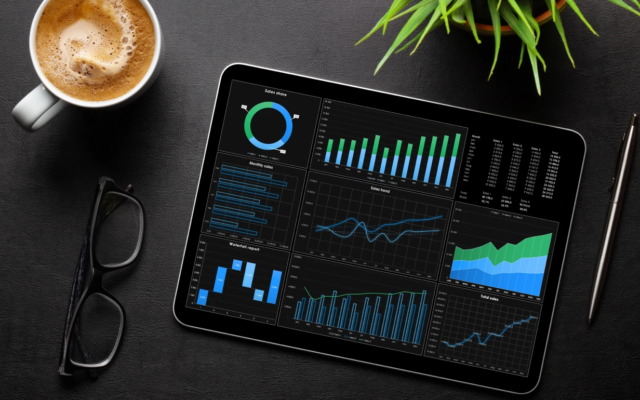“We are surrounded by data, but starved for insights.” These words of Jay Baer, a marketing and customer experience expert, inspire us to use information rationally for making more informed decisions. Data aggregation is a key strategy for achieving this effectively. Today, indeed, it stands out as a popular solution, assisting businesses in transforming raw data into actionable insights.
The numbers speak for themselves. According to Statista, in 2021, revenue from the data industry was estimated to be $162,6 billion, and it’s projected to reach $273,4 billion by 2026. The growth rate in the vertical can reach 11%. No doubt, the big data market is picking up steam by turning into both a trend and a necessity for monetizing datasets.
But before diving into data aggregation, you may want to explore what benefits it can bring to the table, the tools that will assist you, and use cases in diverse verticals.
That’s why the Forbytes team is here to help. Keep reading to learn more about data aggregation, benefits, and the instruments for extracting valuable insights.
What Is Data Aggregation?
Wouldn’t it be great if your data allowed for more informed decisions? Just imagine you’re collecting data and presenting it to your team. Together you analyze it and build strategies that may be related to increasing sales, maximizing marketing efforts, and more. Look like quality teamwork and a wonderful time spent.
But, indeed, it can be tiresome, time-consuming, and irrelevant when there is an opportunity to aggregate data. It can help you collect and use information swiftly and effectively. Additionally, data aggregators speed up insight extraction, allowing the filtering of outdated datasets.
Types of Data Aggregation
Humans and machines are often in competition with each other. And it’s obvious again in the division of data aggregation into manual and automated. So, let’s see the differences between them and how they work.
Manual data aggregation
Manual data aggregation involves the following steps: exporting data, reviewing information, and aligning it with other datasets. As evident, this process is time-consuming and can take up to several hours or even days.
Manual data aggregation methods are well-suited for smaller projects or situations where human interpretation and judgment are crucial. So, you can apply them if you deal with simple datasets.
Automated data aggregation
Fortunately, today, companies can use an automated export and aggregate data in just minutes. Machines excel in processing extensive volumes of information and are especially recommended for handling large-scale and repetitive tasks.
The scope of automated data aggregation is vast. It includes regular reporting, competitive analysis, and data monitoring. And this is not a full list. Moreover, automated methods play a crucial role in predictive analytics and performance analysis.
All in all, each type of data aggregation has its value. The choice between them depends on factors such as the volume of data, the need for real-time analysis, and project complexity. Finally, it’s up to you how to aggregate your data.
Top Data Aggregation Tools
The number of data aggregation tools is growing rapidly, much like mushrooms after rain. You may feel confused and unsure about how to opt for the most efficient one. But, luckily, you’re at the right place, and we’ll assist you in choosing the most productive ones.
Microsoft Excel
Microsoft Excel is one of the most powerful tools for data aggregation and statistical analysis. You simply need to enter different formulas, and machine learning algorithms will handle data aggregation for you.
Are you tired of manual calculations, sorting, and other data operations? Unveil the aggregate power of Excel and organize your data in a meaningful way. Transform your datasets into dynamic tables for convenience and enhanced functionality.
But Microsoft Excel is an optimal choice for smaller and medium-sized datasets. If you need more complex analysis and deal with larger datasets, you should consider other tools.
Google Analytics
With Google Analytics you can centralize, visualize, and analyze data from multiple sources. It’s a powerful web analytics service for monitoring online performance metrics and enhancing digital marketing strategies.
You dream of learning more about your users and getting more insights into how to achieve success in a marketing campaign. With Google Analytics, you can turn that into reality. It allows you to aggregate data on website traffic, track conversions, and segment your target audience.
Google Analytics is a valuable tool for optimizing online performance and maximizing digital marketing efforts. With this data aggregator, you’ll better understand your customers’ needs and preferences.
Salesforce
I’m sure that, like other companies, you’ve collected data on clients’ information, transaction history, and interactions. We’ve all done it. With Salesforce, it’s easier to keep track of as much customer data as you need.
This data aggregation tool is very helpful for your sales, marketing, and customer support teams. As a result, they become more efficient in managing sales activities, conducting marketing campaigns, and organizing customer information. For example, Salesforce empowers sales teams to identify trends, forecast revenue, and monitor the sales pipeline.
That’s why, consider Salesforce as a tool that not only centralizes and organizes your datasets but also significantly enhances customer relationships and fuels business processes.
Benefits of Data Aggregation
Have you ever faced a dilemma when dealing with a large volume of information but failing to use it efficiently? I’m sure that yes, especially if your data are from different and multiple sources. Another concern is how to summarize them to create accurate and insightful reports.
To address these issues, many businesses aggregate their data which makes it easier to analyze and interpret large amounts of information. As a result, companies that do this, get amazing advantages that help them stay ahead of the competition. Let’s explore how you can benefit from data aggregation.
Multiple data sources for valuable insights
One of the key benefits of data aggregation, particularly for e-commerce platforms, is the opportunity to collect information from numerous sources and make valuable insights through data analytics. What’s more, data aggregation services can assist in verifying the facts found. So, multiple-sourced and credible data and strategic insights, why not?
At Forbytes, while working with e-commerce clients, we aggregate data to provide the most accurate and up-to-date product descriptions. As a result, our customers can get unique product pages. We also use data aggregators to support our clients’ data-driven decision-making.
Informed purchasing decisions to reach more clients
You have to present a more complete product page to your clients, but you find it hard to create it? This is another case when data aggregation can become a lifesaver. By aggregating data, you can provide more quality and valuable content for your product page. As a result, it will better answer customers’ questions, assisting them in making more informed purchasing decisions.
At Forbytes, we aggregate data to access up-to-date product information which can assist customers in the buying process. We promote gathering quality and credible data, considering it a key determinant of an e-commerce platform’s success.
Enhanced marketing for higher conversion rates
One of the benefits of data aggregation is the enhancement of marketing which goes beyond just market visibility – it directly impacts higher conversion rates. By using data aggregators, you can see insights into your rankings, user behavior, and other crucial metrics for making informed, data-driven decisions.
At our company, we employ data aggregators to summarize information from multiple sources and use the most relevant one for creating compelling product descriptions for e-commerce stores. Beyond building e-commerce platforms, we actively contribute to making data-driven decisions and attracting potential audiences in real estate, fintech, and more.
Use Cases of Data Aggregation in Different Verticals
Currently, the major sectors gathering large volumes of data are retail and e-commerce, financial services and banking, and real estate. Let’s explore why they aggregate their data.
Data aggregation in retail and e-commerce
Today, the retail and e-commerce sector is one of the most competitive and skyrocketing industries. Data aggregation plays a vital role in this vertical in various ways.
Among the most prominent applications of data aggregators in this area are price monitoring and product description. It’s safe to say that e-commerce and retail companies need to monitor products, prices, and promotions offered by competitors. The main reason is not only to stand out in the crowded market but also to reach customers who are bombarded with offers from all sides.
As a result, e-commerce platforms and retailers focus on gathering relevant data through competitor tracking. In doing so, they manage to present unique and appealing product catalogs, adjust prices dynamically, and precisely target their audience.
Data aggregation in financial services and banking
Financial services companies use data aggregators to generate regular reports and conduct detailed analyses of industry events. The accurate and timely collection of information is vital for this industry, shaping how organizations interact with clients, make decisions, and manage risks.
Why do financial companies aggregate data? And how do they use the received information?
First, they focus on providing personalized services. This involves collecting personal information, account balances, and transaction history to create a comprehensive client profile.
Second, banks are interested in comprehensive financial planning. To achieve this, they aggregate data from diverse customer accounts, including loans, savings, and investments. This approach enhances a better understanding of client’s needs, allowing for the provision of personalized services.
Finally, data aggregators play a vital role in enabling open banking and open finance, introducing innovative solutions. This includes business-to-business and direct-to-consumer services that reshape how fintech and banks approach their operations.
Data aggregation in real estate
Accurate and comprehensive property data can empower the real estate market. That’s why, data aggregation can be the driving force for marketplaces, significantly influencing their position and success.
In this industry, data aggregators usually collect and process property information to provide marketplaces with data on residential real estate, mortgages, foreclosed properties, and construction projects. The availability of reliable data contributes to more informed decisions from buying and financing to constructing properties and occupying and leasing them.
By aggregating real state data, you attract and inform home buyers, convincing clients that your realty firm is reliable. What’s more, collecting data serves as a valuable tool for real estate professionals, investors, and other stakeholders, providing actionable insights.
It’s safe to say that the future looks bright for many industries with data aggregation. And if you’re still in doubt whether it’s a good idea to collect your data or not, we as e-commerce experts, can confidently say yes, it’s 100% worth it. Through data aggregation, you’ll access relevant data on products and target audiences, presenting the most accurate, consistent, and robust content for your e-commerce platform or marketplace.
Final Thoughts
Now you know the main benefits of data aggregation across diverse industries and how to use them for maximum business returns. So, what about you? Why do you have to let all these benefits pass by?
If you’re looking to learn how to use big data and track competitive prices, feel free to read about data analytics trends for insightful ideas. As adept at data science, we don’t miss an opportunity to explain to our clients how they can benefit from their data.
And when you’re looking for some additional help, Forbytes is at your service. With expertise in such verticals as e-commerce, fintech, real estate, and more, we can be your reliable partner and turn your data into tools for building successful product, price, and promotion strategies. Contact us, and we’ll get back to you as soon as possible.

Our Engineers
Can Help
Are you ready to discover all benefits of running a business in the digital era?

Our Engineers
Can Help
Are you ready to discover all benefits of running a business in the digital era?













